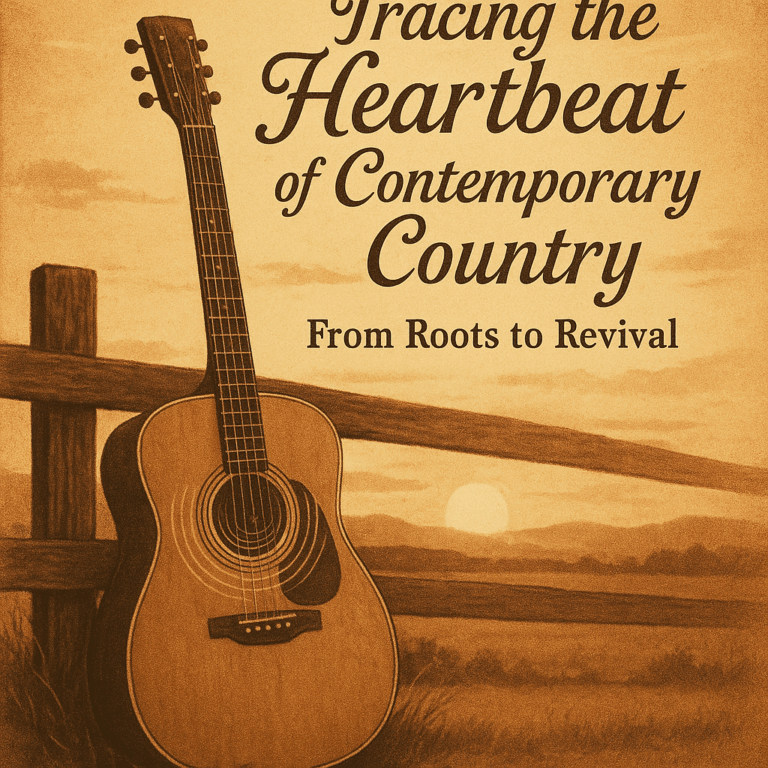The Roots of Contemporary Country: A Living Tradition

The story of contemporary country music is a vibrant thread woven into the rich tapestry of American music. It stands proudly upon the foundations laid by early country pioneers while embracing modern sensibilities, creating a dynamic soundscape that speaks to the heart of today’s listeners. To understand contemporary country, we must travel back to its origins, where heartfelt storytelling met the twang of string instruments under open skies and porch lights.
Contemporary country music traces its lineage back to the early 20th century Appalachian ballads, fiddle tunes, and gospel harmonies. These sounds, carried by the voices of working-class Americans, told of everyday struggles, joys, heartbreaks, and celebrations—forming an authentic narrative deeply ingrained in the culture of rural America. The post-World War II era brought the honky-tonk twang of Hank Williams and the polished Nashville sound of Patsy Cline, setting the stage for songs that blended tradition with burgeoning pop influences.
By the late 20th century, country music was evolving, responding to a wider audience’s tastes and the changing landscape of American music itself. This era saw the rise of what we call “contemporary country,” a genre that maintains the storytelling soul of its predecessors while incorporating fresh rhythms, production techniques, and broader lyrical themes. It’s more than just a style—it’s a beautifully crafted dialogue between yesterday’s roots and today’s pulse.
Defining the Sound and Spirit of Contemporary Country
Contemporary country music is as much about emotion as it is about instrumentation. At its core, it is a narrative art form, using melody to amplify stories that resonate deeply with listeners. Unlike the pure traditional country which leans heavily on fiddles, steel guitars, and bare arrangements, contemporary country often blends these instruments with electric guitars, drums, and even subtle pop production. This fusion creates a sound that is polished yet warm, familiar yet fresh—a sonic embrace that invites everyone in.
Lyrically, contemporary country spans a broad emotional spectrum. It honors classic themes of love, loss, family, and small-town life while exploring modern topics like self-empowerment, social change, and the complexities of contemporary relationships. This evolution reflects a genre not static but growing, mirroring the changing realities of its audience. It retains an intimacy born of the singer-songwriter tradition, where every verse feels like a shared moment between artist and listener.
Voices That Define Contemporary Country
Several artists have become the heartbeat of contemporary country, bridging generations and expanding the genre’s reach. Carrie Underwood’s soaring vocals and storytelling prowess have won millions of hearts, earning her a place among country’s great voices. Her debut album, “Some Hearts,” is a tapestry of powerful ballads and upbeat anthems that showcase contemporary country’s versatility.
Keith Urban, with his virtuosic guitar skills and genre-crossing sensibility, brings a sleek edge to country music, merging rock influences with heartfelt lyrics. His work represents the genre’s willingness to innovate without losing its core identity.
Miranda Lambert commands attention with her raw, unapologetic lyrics and fiery performances, telling stories of resilience and independence that resonate deeply with those who crave authenticity.
Meanwhile, stars like Luke Bryan and Kelsea Ballerini offer anthems of celebration and youthful exuberance, shaping contemporary country into a genre that honors tradition while embracing the spirit of modern American life.
Timeless Songs and Albums That Shaped the Genre
Certain songs become touchstones in the story of contemporary country music, each carrying a pulse that echoes beyond their initial release. Carrie Underwood’s “Before He Cheats” is not just a song about heartbreak but a bold anthem of empowerment that redefined the genre’s approach to female narratives.
Keith Urban’s “Blue Ain’t Your Color” is a tender, evocative ballad reminding us of country music’s enduring ability to weave subtle stories of compassion and empathy.
Miranda Lambert’s “The House That Built Me” is a haunting journey into nostalgia and personal history—an intimate masterpiece that pulls listeners into deep reflection.
Albums like Jason Aldean’s “Night Train” and Chris Stapleton’s “Traveller” have also elevated contemporary country to new heights, blending raw emotional honesty with musical craftsmanship, breaking the constraints of traditional country to attract diverse audiences.
The Enduring Impact of Contemporary Country Music
What makes contemporary country music profoundly meaningful is its ability to adapt while preserving heart and heritage. Its lasting effects stretch beyond charts and sales, embedding themselves in the cultural fabric of American music and life.
This genre continues to remind us that country music is not just sound; it is shared memory and collective storytelling. Contemporary country artists carry forward the voices of bluegrass fiddlers and honky-tonk singers, giving them life in new contexts while inviting fresh perspectives.
Through radio waves, streaming platforms, and live performances, contemporary country music unites people from every walk of life, providing a soundtrack for celebrations, solace in tough times, and a beacon for the stories of everyday heroes.
In the grand symphony of American music, contemporary country stands as a testament to the power of perseverance, connection, and heartfelt storytelling. It is a genre that honors its past and embraces its future with open arms, proving that the twang of a steel guitar and the sincerity of honest lyrics will always find a home in the hearts of those who listen.